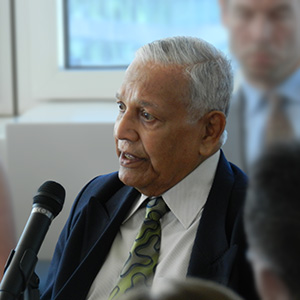

On August 2, 2013, the Vienna Center for Disarmament and Non-Proliferation (VCDNP) hosted a seminar by Justice Christopher Gregory Weeramantry, a Judge of the International Court of Justice (ICJ) from 1991-2000 when the ICJ delivered an advisory opinion in 1996 about the Legality of the Threat or Use of Nuclear Weapons. The decision provides one of the few authoritative judicial decisions concerning the legality under international law of the use or the threat of use of nuclear weapons. Judge Weeramantry spoke on "The Current Nuclear Problems: Disarmament and the Humanitarian Aspects of Nuclear Weapons."
Judge Weeramantry discussed the debate behind the proceedings leading to the 1996 ICJ advisory opinion. He explained that while the Court was in agreement that "the threat or use of nuclear weapons would generally be contrary to the rules of international law," it ultimately decided in a split vote that "in the current state of international law" the court "cannot conclude definitively whether the threat or use of nuclear weapons would be lawful or unlawful in an extreme circumstance of self-defence, in which the very survival of a State would be at stake." As one of the 7 dissenting justices on this provision, Judge Weeramantry disagreed with this finding and contended that there is in fact no case in which nuclear weapons use or threat of use would be legal.
He argued that nuclear weapons in and of themselves represent a violation of both international humanitarian law and the laws of all of the world's major religions. He pointed to examples from Hindu, Christian, Islamic, and Buddhist texts and beliefs, all of which condemn weapons of mass destruction. He also asserted that nuclear weapons violate international humanitarian law, specifically referring to obligations to protect non-combatants, neighboring countries, civilians, women, children, future generations, and the environment. Therefore, he argued, under the general principles of international humanitarian law, the use or threat of use of nuclear weapons is illegal.

Judge Weeramantry expressed his conviction that because the use of nuclear weapons is already illegal under humanitarian law, there is no need for a nuclear weapons convention. Instead of negotiating a new treaty, he said, what is needed is to build a better global understanding of international law and to rebuild the bridge between religious and international law.
Judge Weeramantry deemed the Nuclear Weapon States to be not complying generally with their obligation under Article VI of the Nuclear Nonproliferation Treaty "to pursue negotiations in good faith on effective measures relating to nuclear disarmament and on a treaty on general and complete disarmament under strict and effective international control." He contended that making reductions in numbers of nuclear weapons while improving in weapon yield and quality contradicts the "good faith" requirement. Additionally, he explained that despite the stated positions of some states, an ICJ advisory opinion is binding on all states, regardless of their acceptance of jurisdiction of the ICJ.
Judge Weeramantry concluded that the best way to forge a worldwide understanding of the illegality of nuclear weapons in international humanitarian law is through global peace education and promotion of the general laws of the world. He recommended that peace education be made compulsory throughout the world, that it be infused into every school lesson, and that it include lessons in cross cultural understanding. He also looked to the first International Peace Conference of 1899 as a model for how world leaders and civil society can come together to discuss a path toward a peaceful world through international humanitarian law.

By continuing to use the site, you agree to the use of cookies. more information
The cookie settings on this website are set to "allow cookies" to give you the best browsing experience possible. If you continue to use this website without changing your cookie settings or you click "Accept" below then you are consenting to this.